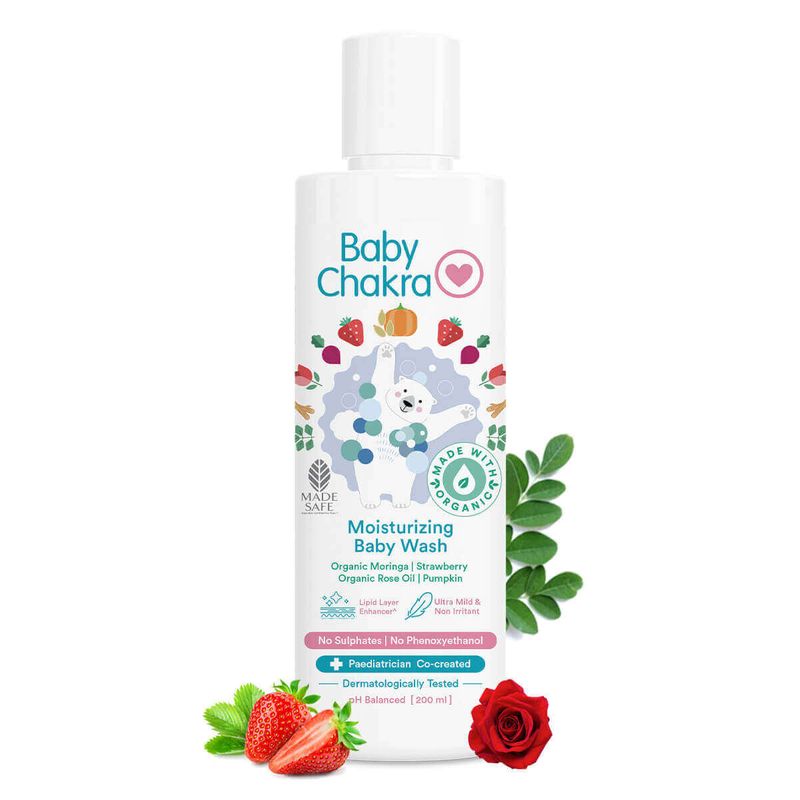
Soap V/S Body Wash For Babies: Which Is Better?
18 Aug 2022 | 3 min Read
Sayani Basu
Author | 607 Articles
Parents today have so many things more than what our mums had – numerous choices when it comes to baby products. But with these options, comes the difficulty to decide on what they should choose for their little ones. One such dilemma is soap v/s body wash for babies. Which is better?
According to medical studies, the hydrolipidic film in babies mainly consists of sweat, sebum, and water and is 20-30% thinner than in adults. This film protects the skin against bacteria and acts as a shield and the thinner hydrolipidic film makes the little one’s skin more sensitive. That is why it absorbs water quickly and is more prone to dryness, and irritation. So, which one shall mums opt for?
Soap Or Body Wash?
There are plenty of baby-safe soaps and body washes available in the market. But before opting for these, it is important to check their pH level. As the pH level of a baby’s skin is 5.5 and is lower than the pH of water (7), their skin is acidic. Acidic skin is more equipped to fight the spread of bacteria or fungi.
Therefore, it is important to maintain the 5.5 pH level to support the natural acid mantle of the little one against environmental stress. If this barrier is disrupted, it can become extremely dry and your baby’s ultra-sensitive skin then becomes susceptible to environmental factors such as weather, allergens, irritants and infection. Keeping these in mind, it is advisable to use a body wash for babies that are formulated using certified organic ingredients.
5 Reasons To Try BabyChakra’s Moisturising Baby Wash
- This body wash is built with lipid layer enhancers and USDA-certified ingredients to strengthen your little one’s skin barrier and provide deep nourishment to the skin.
- Your baby’s skin is still developing and is ultra-sensitive and this baby wash helps your baby’s skin to stay supple, soft, hydrated and nourished.
- The plant-based cleansers used in its formulation gently clean your baby’s skin without over-drying it and gives it extra nourishment and nutrients and protect it from losing moisture.
- Strawberry oil, manjistha extract, moringa seed oil and D-panthenol are some of our star ingredients. Here are some of the uses of these ingredients:
- Strawberry oil – Strawberry oil deeply moisturises your baby’s super-sensitive skin without clogging its pores.
- Manjistha extract – Manjistha extract is enriched with antibacterial, anti-inflammatory and antioxidant properties and does wonder in healing your baby’s irritated skin.
- Moringa seed oil – Moringa seed oil not only hydrates your baby’s skin but also prevents and treats the little one’s dry skin conditions.
- D-panthenol – D-panthenol acts as a protective barrier on the little one’s skin surface and thus prevents moisture loss.
- This baby wash is devoid of nasties like paraben, mineral oil, sulphates, synthetic colour and fragrances, and preservatives which can cause skin irritations and health hazards including hormonal disbalance when absorbed into the skin.
Choosing the right body wash that’s specially formulated for your baby, with the right pH balance will ensure that your baby’s skin gets the perfect nourishment. So what are you waiting for? Get this body wash for your baby right away!
Cover Image Credit: pexels
A


Suggestions offered by doctors on BabyChakra are of advisory nature i.e., for educational and informational purposes only. Content posted on, created for, or compiled by BabyChakra is not intended or designed to replace your doctor's independent judgment about any symptom, condition, or the appropriateness or risks of a procedure or treatment for a given person.

